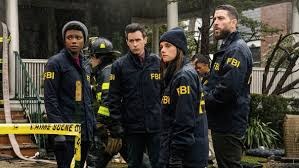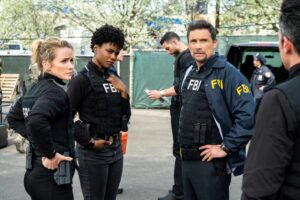
Introduction: The Fallout from Taking Down a Drug Cartel Leader
The FBI TV Show has never shied away from tackling real-world issues, and the latest episode is no different. In a shocking twist, the FBI faces unforeseen dangers after successfully capturing a notorious drug cartel leader. While this may seem like a win on the surface, the consequences of taking down such a powerful figure are far more complex and dangerous than anyone could have imagined.
In this article, we’ll explore the aftermath of the cartel leader’s capture, the risks that the FBI now faces, and how the show is masterfully portraying these high-stakes situations.
The Dangerous Fallout of Bringing Down a Drug Kingpin
Unmasking the Power of Cartels: What Happens When Leaders Fall?
When a drug cartel leader is brought to justice, it’s supposed to be a major victory for law enforcement. However, the FBI TV Show reveals that such victories can create a void that other, often more dangerous, groups will rush to fill. The fallout isn’t just about putting one criminal behind bars—it’s about how the power vacuum left in their wake fuels chaos, violence, and retaliation.
A cartel leader isn’t just an individual; they are a symbol of control, power, and influence. Removing that figurehead can trigger a catastrophic chain of events, and the FBI finds itself fighting not just against the cartel, but against a world of enemies that now sees the agency as a target.
The Target on the FBI’s Back: Is the Agency Ready for the Consequences?
When the FBI takes down a drug kingpin, they’re putting a giant target on their backs. The show portrays the immediate dangers—cartel members and rival gangs scrambling to take over the organization’s operations. But what happens when the people who are supposed to be the protectors now find themselves in the crosshairs?
The FBI’s vulnerability is heightened when an unstable criminal landscape is left behind. Rival drug factions and even other international crime organizations often see the agency as the only real obstacle to their ambitions, making the FBI’s operations increasingly dangerous.

How the Cartel’s Fall Amplifies the Risks to the FBI
Escalating Violence: What’s at Stake for Agents on the Ground?
The moment a cartel leader is captured or killed, the show takes us deep into the personal and professional stakes for FBI agents. The FBI’s job is already perilous, but with a cartel in disarray, agents find themselves in more danger than ever before. Armed conflicts break out, and agents are forced into high-stakes situations, often unsure of who they can trust.
It’s not just the criminals the FBI agents need to worry about—it’s the collateral damage caused by the unraveling of a cartel’s infrastructure. Violence spills into public spaces, making every mission riskier and every operation more deadly.
Undercover Operations: The Ultimate Test of the FBI’s Resilience
As the cartel’s network fractures, many of its lower-level operatives are left with few options: they either take on new roles or fight back against the very agency that caused their leader’s downfall. The FBI responds by pushing forward with undercover operations, but how sustainable are these efforts when the agency is under fire from all sides?
In these moments, the agents’ resolve is tested. How much can they risk to continue dismantling criminal networks when they are exposed to imminent threats?
The Cartel’s Reach: The Complex Web the FBI Now Faces
A Worldwide Threat: How the Cartel’s Fall Ripples Across Borders
The drug cartel in question doesn’t just operate locally—it has a far-reaching influence. The FBI TV Show highlights how these organizations have deep connections with international crime syndicates, making the threat even more complicated.
The moment a cartel leader is taken down, their network is exposed, and the repercussions can be felt globally. Drug trade routes, money laundering schemes, and even political connections are all at risk of being exposed, which places everyone from agents to government officials in jeopardy.
The FBI’s Moral Dilemma: Sacrificing for the Greater Good
With the capture of the cartel leader, the FBI must grapple with a profound moral dilemma. How much collateral damage is acceptable in the pursuit of justice? The show doesn’t shy away from exploring the fine line between upholding the law and keeping the people safe.
There’s an emotional toll that comes with risking everything for the mission, especially when agents find themselves questioning the worth of one life versus another, and the price of peace.
The FBI’s New Strategy: Adjusting to a New Reality
A Changing Landscape: How the FBI Responds to an Evolving Threat
The moment the cartel’s power structure falls, new dynamics emerge, and the FBI must adapt. The show depicts the FBI working harder than ever to predict and respond to the chaos they’ve caused. They can’t afford to sit back and relax after a major victory; in fact, it’s when they are most vulnerable.
The FBI’s response strategy involves not only bringing criminals to justice but also ensuring their safety against growing threats. With each new encounter, they must adjust their tactics, pushing the limits of what’s possible in law enforcement.
Strengthening the Lines: Internal Security and the FBI’s Fight to Survive
Internally, the FBI must deal with the possibility of leaks, betrayals, and the unsettling reality that some agents may have to make difficult decisions in the face of overwhelming danger. How do you fight an enemy you can’t always see? The FBI TV Show explores the agency’s attempt to strengthen its internal security and prevent further breaches while simultaneously engaging in an all-out battle against organized crime.
The Cartel’s Last Stand: What’s Next for the FBI?
Fighting on Multiple Fronts: The FBI’s War on Cartel Violence
As the FBI TV Show unfolds, it becomes clear that the fall of one cartel leader doesn’t signal the end of the war. Instead, it opens up a new chapter of challenges. New threats, new leaders, and new alliances form in the wake of the collapse, making the FBI’s mission more complicated and unpredictable.
The cartel’s last stand is a deadly game, and the FBI is at the center of it all, trying to anticipate the next move while ensuring that justice is served. With every decision, the stakes grow higher, and the risks become even greater.
Conclusion: The FBI’s Resilience in the Face of Unseen Dangers
The FBI TV Show masterfully portrays the complex, high-stakes world of law enforcement as the agency faces unforeseen dangers after taking down a drug cartel leader. The show highlights not only the immediate risks but also the long-term consequences that come with such a monumental victory. From escalating violence to international repercussions, the FBI must adapt, strengthen its resolve, and work tirelessly to maintain control over the growing chaos.
At the heart of this intense situation, one question remains: Can the FBI survive the dangerous fallout from taking down a cartel leader? Only time will tell, but one thing is certain—the stakes have never been higher.
FAQs:
1. Why does the FBI face increased danger after capturing a drug cartel leader?
The capture creates a power vacuum, leading to violence, retaliation, and potential attacks on the FBI as rival criminal groups vie for control.
2. How does the FBI handle the fallout from cartel violence?
The FBI adapts its strategies, increasing undercover operations, and reinforcing internal security to combat the rising threats.
3. What role does international crime play in the FBI’s challenges?
The drug cartel has global connections, making the FBI’s efforts to dismantle it far more complicated and dangerous.
4. How does the FBI balance justice and safety in the face of such threats?
The FBI must grapple with tough moral decisions, often risking agents’ lives while trying to ensure justice is served without compromising safety.
5. Will the FBI be able to stop the rise of new cartel leaders?
The show suggests that while the FBI may have taken down one leader, the war against organized crime is far from over, and new threats will emerge.